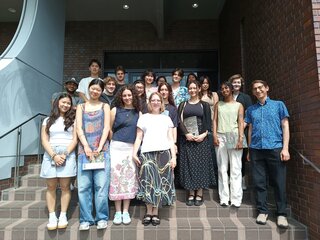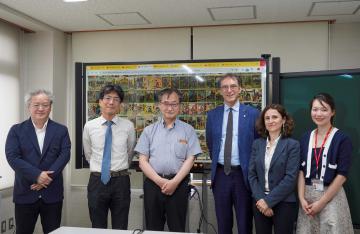-
[イベント情報]September 25, 2025(Thu)
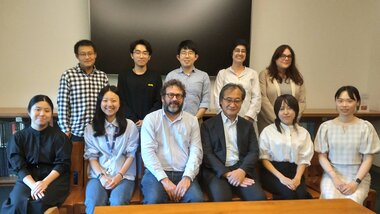
Organized by the Center for Japanese Studies (CJS), University of California, Berkeley, and the Art Research Center (ARC), Ritsumeikan University, a joint colloquium was held at the University of California, Berkeley, on September 17, 2025.
Date & Time: Wednesday, September 17, 2025, from 3:00 PM
Venue: East Asian Library, University of California, BerkeleyOrganizer: Art Research Center (ARC), Ritsumeikan University; Center for Japanese Studies (CJS), University of California, Berkeley
Supported by: International Joint Digital Archiving Center for Japanese Art and Culture (ARC-iJAC), Art Research Center, Ritsumeikan University(This was a closed event.)
Program
1. Modern and Contemporary Kyōyaki through Kiln Tools: A Case Study of the Fireclay Saggars from the Gorōsuke Asami Kiln
Presenter: Hina Kaneko(金子ひな)
2. The Transformation of the Tokyo Asahi Newspaper's Serialized Fiction in the Late Meiji Period (明治後期の東京朝日新聞における連載小説欄の変革)
Presenter: Subin Jeong (鄭スビン)
3. The Borrowing and Evolution of Illustrations in Enpon Parodies of Nise Murasaki Inaka Genji
Introduction
Presenter: Kirari Itami (伊丹稀星)
4. Dusk and Dawn of Literary Friendship: Santō Kyōden at the Turn of the Nineteenth Century (文の友、暮れと明け: 十九世紀をめぐる山東京伝)
Presenter: Yisheng Tang (唐藝晟)Reception
The 33rd Special Exhibition "川を描く、川をつくる―古地図で昔の堤をさぐる―" is held at the Lake Biwa Museum, supported by the FY 2024 ARC-iJAC project "Development of a database on traditional river management information in the Echi River, Shiga Prefecture, Japan."
Date: July 19 (Sat) - November 24 (Mon), 2025
Hours: 9:30 AM - 5:00 PM (last admission at 4:00 PM)
Venue: Special Exhibition Room, Lake Biwa Museum, Shiga PrefectureOn May 22, 2025, a group of students from Northeastern University visited the Art Research Center (ARC) as part of the university's study abroad program Dialogue: Shoshin Japan: Art, Craft, and Design in Kyoto. The group was led by Associate Teaching Professors Jamal Thorne and Kate Terrado of the College of Arts, Media, and Design (CAMD) at Northeastern University.
Besides touring the ARC's building and facilities, discussions and an exchange of ideas on collaboration in digital humanities took place with Dr. Travis Seifman (Associate Professor, Kinugasa Research Organization/ARC Research Manager).
[イベント情報]January 28, 2025(Tue)On January 6, 2025, an article in the newspaper "San-in Chuo Shimpo" introduced the initiative led by Prof. Ryo Akama (College of Letters/Director of the ARC) to make the digitized materials in the collection of the Tsukiji Sugoroku Museum available to the public through the ARC database system,.
The database, containing 650 Sugoroku items, representing about 500 different kinds of Sugoroku game boards, dating from the Edo period to the early 1950s, has been collected by Osamu Yoshida, President of the Tsukiji Sugoroku Museum (https://sugoroku.net/).
Tsukiji Sugoroku Museum Database:
■ URL:https://www.dh-jac.net/db/nishikie/search_tkjSG.phpRelated article: https://www.arc.ritsumei.ac.jp/j/news/pc/023655.html
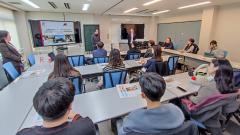
On December 6, 2024, a group of faculty members and students of Korea University, led by Prof. Byeong-Ho Jeong (Department of Japanese Language and Literature, College of Liberal Arts, Korea University), visited the Art Research Center (ARC).
Besides a tour of the ARC building and facilities, discussions and an exchange of opinions on collaboration in digital humanities took place with Prof. Satoshi Tanaka (College of Information Science and Engineering) and Dr. Travis Seifman (Kinugasa Research Organization/ARC Research Manager).
[イベント情報]November 14, 2024(Thu)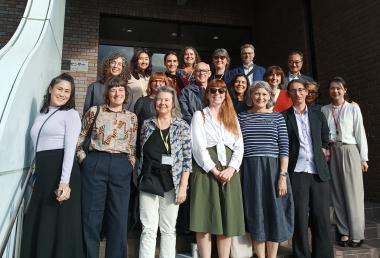
On October 28, 2024, the Art Libraries Society of North America (ARLIS/NA), whose members are affiliated with various art libraries and university libraries in the U.S. and Canada, visited the Art Research Center (ARC) as part of its first study tour to Japan.
Besides a tour of the ARC building and facilities, discussions and an exchange of opinions on collaboration in digital humanities took place with Prof. Ryo Akama (College of Letters/Director of the ARC) and Dr. Travis Seifman (Associate Professor, Kinugasa Research Organization/ARC Research Manager).
[イベント情報]September 10, 2024(Tue)On September 8, 2024, Prof. Changgong Meng (President, Dalian University) visited the Art Research Center (ARC).
Besides a tour of the ARC building and digital archiving facilities, Dr. Travis Seifman (ARC Research Manager/Associate Professor, Kinugasa Research Organization, Ritsumeikan University) gave an introductory presentation on the DH research activities of the Center.
[イベント情報]July 30, 2024(Tue)The 4th online workshop was held on July 30, 2024 as part of the international joint research project Creative Collaborations: Salons and Networks in Kyoto and Osaka 1780-1880 (「上方文化サロン:人的ネットワークから解き明かす文化創造空間 1780-1880」), supported by UK Research & Innovation (UKRI) and the Japan Society for the Promotion of Science (JSPS),
The research project--a collaborative scholarly enterprise among researchers and institutions in Japan and the UK--aims to analyse the cultural and social impact of art and literary salons and the collective creation of art (gassaku) in early modern Japan, particularly in the Kyoto-Osaka region during 1780-1880.
Date: July 30 (Tues), 2024, from 18:00 JST/10:00 BST
Venue: Online via ZOOM
※This was a closed workshop.
On July 22, 2024, an article on Sakana AI's Ukiyo-e AI, which ARC had supported, was released and published in the Asahi Shimbun Digital.
[イベント情報]July 3, 2024(Wed)On July 3, 2024, Prof. Giovanni Molari (Rector, Bologna University) and Raffaella Campaner (Vice Rector for International Relations, Bologna University) visited the Art Research Center (ARC).
Besides a tour of the ARC building and facilities, discussions and an exchange of opinions on collaboration in digital humanities research and education took place with Prof. Ryo Akama (College of Letters/Director of the ARC).


